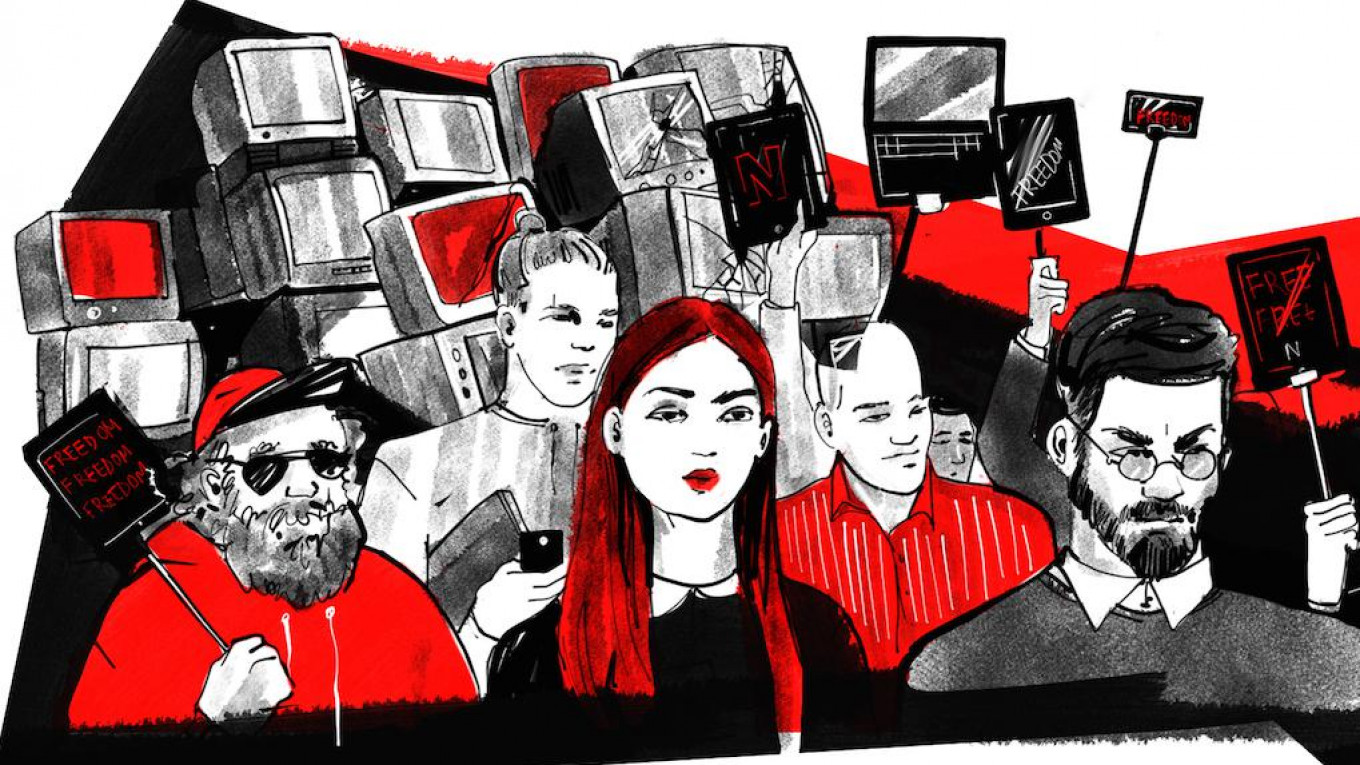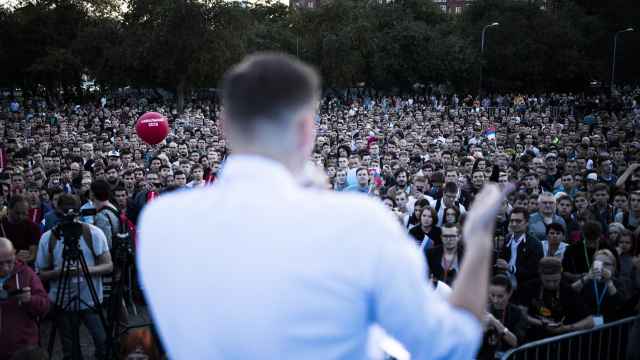Officially, Russian opposition leader Alexei Navalny lags far behind President Vladimir Putin in popularity. While Putin rules the political scene with approval ratings of 80 to 90 percent, Navalny — totally barred from national television — doesn’t even make it into the opinion polls.
But if measured by influence, Navalny is Putin’s only major competitor. Unlike anyone else, he challenges the Kremlin and forces it to react, thus shaping the political agenda.
This is an important Russian phenomenon: Change and authority do not necessarily grow from wide support. What matters is the ability to interrupt the status quo.
Navalny’s major achievement this year was a series of mass protests that swept across Russia, from East to West. His ability to mobilize huge crowds took the political elite by shock. Even more surprising was the fact that those who took to the streets at Navalny’s call were younger than ever before. Youths roughly between the ages of 16 and 25 have become the face of these protests.
Still, from Putin’s perspective, the stage is set for his next term and the 2018 presidential election should be a smooth ride. Since the 2014 annexation of Crimea, the president’s ratings have returned to their previous extreme highs. His powers are absolute and his individual rule is a given, a situation more reminiscent of a monarchy than an undeveloped democracy.
And according to the polls, Russian society is ready to accept this. A primitive “[political] mentality from the 18th or 19th century” now dominates in Russia, according to Alexei Levinson, a sociologist from the independent Levada Center.
But while Navalny’s crowds have come as a surprise blow to the elite, they could hardly be considered unexpected.
A New Agenda
When Putin returned to the presidency for his third term in 2012, he brought a new ideology with him. Russia was declared a harbor of traditional values in a global sea of immorality. The criminal case against Pussy Riot demonstrated the Russian Orthodox Church’s leading social role. The passage of notorious legislation prohibiting “gay propaganda” among minors recalled the Soviet era, when homosexuality was a crime. The annexation of Crimea was designed to seal the deal on the new consensus.
Yet every action generates a reaction. The mood started changing in 2013 and 2014, says Nina Nazarova, women’s affairs correspondent at BBC’s Russian Service. The backlash against the new conservative state policy created its own counter-trend.
A new agenda — gender, LGBT rights, sexual equality, anti-religious activities, and individualism — began to take shape.
If not for technology, this debate would never have occurred: Social networks formed the ecosystem for this new agenda. Flash mobs and activist campaigns became routine and spread their influence far and wide.
Examples abound. In 2016, thousands of women in Ukraine, Russia, and Belarus took to social media to share their experiences of sexual violence in the “#IAmNotAfraidToSpeak” flash mob. The same year, a Facebook-generated campaign to expose sexual abuse in one of Moscow’s elite schools turned into a Russian version of the film “Spotlight,” influencing the entire education system.
In fact, the spread of feminism in Russia went far beyond Facebook posts. One recent survey suggests that Russian society, as patriarchal as it may be, has seriously reevaluated the gender issue. By default, men still have more authority. But in reality, Russian traditionalism is largely a myth. Today, women care about their independence and pursue their own careers, while men are far more involved in family matters than before.
A heavy state
Of course, it’s not only about gender.
In March, after a terror attack in the St. Petersburg metro killed 14 people, the city was electrified with a spirit of solidarity Russia had never seen before. Taxis canceled fares for stranded passengers. Cafes provided free tea. Locals invited those in need into their homes. Once again, social networks emerged as a major tool of mutual assistance.
The change in Russians’ self-perception comes in different forms. Activists fight against discriminatory legislation. Historians form NGOs to defend their field from political abuse. Muscovites rose up against a massive rehousing program. In St. Petersburg, citizens united against transferring the city’s iconic St. Isaac’s Cathedral to the Russian Orthodox Church.
In today’s Russia, it is difficult to draw a line between people’s search for social identity and political action. There is a simple explanation: Any social actions that people take — even superficially apolitical ones — go against state interests.
In the course of four years, the notorious “homosexual propaganda” law has not once been enforced. Yet it communicates the official state approach.
“I feel as if I have been separated from the rest of society,” says Leonid Zhivetsky, a classical music manager from Moscow.
In 2013, after the law was adopted, Zhivestsky came out along with many other prominent Russian LGBT people in a special issue of the Afisha Moscow lifestyle magazine. Now, Zhivetsky says, he faces no problems in his daily life, yet he remains wary of the state.
“I have a feeling they may start enforcing it,” he says.
Perhaps he has reason to worry. In Russia, the regime only grows heavier. It steadily increases its presence in the social space, says Alexei Levinson. But simultaneously, the regime erodes. It provokes repudiation. And a new generation is now taking the stage.
Search for change
In Fall 2011, Putin was prepared to cruise back into the presidency after four years of Dmitry Medvedev holding highest office. Two months later, he was shocked by the largest mass protests in Moscow since the early 1990s. He didn’t see it coming, and it took him more than a year after his election to take control of the situation.
But these demonstrations didn’t come out of the blue. For years, waves of minor local protests had swept through Russia. Here and there, people protested against bureaucracy, corruption, tax hikes, local law enforcement, etc. That accumulated distrust, fueled by the political thaw under Medvedev, detonated — first in voting booths during the 2011 parliamentary election and then on Bolotnaya Square.
The young protesters who took to the streets to support Navalny this year were actually not so numerous. In fact, they fell far short of what Moscow has seen in recent years. This is definitely not a revolutionary situation.
But the demonstrations this spring should not be viewed as a stand-alone activity. They are part of a much broader picture. The teenagers who took to the streets grew their worldview online. Their protest is, to a significant extent, a reaction against the ideological pressure delivered in schools and colleges. They are part of a backlash against the state agenda, a reaction that takes many different social forms — from feminism and solidarity during crisis to anti-corruption activism.
In the Putin era, Russian political life is all about change — embodied by numerous segments of Russian society — and resistance to change that comes from the country’s leadership. The last major battle for change was lost in 2011 and 2012. But now it looks like much of Russian society is building up strength for a new one.
A Message from The Moscow Times:
Dear readers,
We are facing unprecedented challenges. Russia's Prosecutor General's Office has designated The Moscow Times as an "undesirable" organization, criminalizing our work and putting our staff at risk of prosecution. This follows our earlier unjust labeling as a "foreign agent."
These actions are direct attempts to silence independent journalism in Russia. The authorities claim our work "discredits the decisions of the Russian leadership." We see things differently: we strive to provide accurate, unbiased reporting on Russia.
We, the journalists of The Moscow Times, refuse to be silenced. But to continue our work, we need your help.
Your support, no matter how small, makes a world of difference. If you can, please support us monthly starting from just $2. It's quick to set up, and every contribution makes a significant impact.
By supporting The Moscow Times, you're defending open, independent journalism in the face of repression. Thank you for standing with us.
Remind me later.







